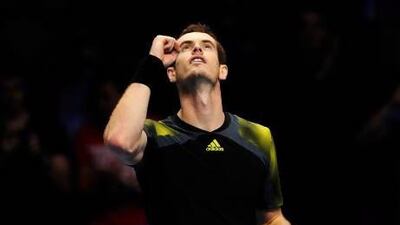It is almost four years since Andy Murray last competed in Abu Dhabi, leaving Zayed Sports City as the champion.
Having defeated both Rafael Nadal and Roger Federer on the way to taking the title, the Briton headed to the 2009 Australian Open looking like a man with a grand slam in his destiny in the not-too-distant future.
Well, when the 25 year old steps on court in the capital tomorrow for his first round match against Janko Tipsarevic in the Mubadala World Championship, he will do so as a major winner.
It just took him a lot longer to get there than anyone expected. The breakthrough finally came in September when he beat Novak Djokovic, the current world No 1, at the US Open, to take the title.
The question really has to be is why it took so long?
Between his success at Abu Dhabi in the inaugural world championship in 2009 and his return for this year's tournament there have been 16 grand slams, and it was the 16th in which Murray got his success at Flushing Meadows.
The first thing to emphasise is the level of competition that Murray faced in this period.
Federer, Nadal and Djokovic are all outstanding players, all guaranteed to be remembered as greats of the games when they finished playing. Even having one of them as opposition would be tricky, having all three, ouch.
Murray's play in Abu Dhabi, and pretty much other tournament other than a major, showed he could hang with the best and beat them, but something was missing on the big stage.
A low point was a horrible performance in the 2011 Australian Open final against Djokovic where nerves appear to overwhelm him, and he retreated into his shell, allowing the Serbian to dictate the game. There clearly was a mental part of the game missing from Murray's armoury.
The 2011 Wimbledon semi-final against Nadal was a prime example.
He was terrific in the first set, barely giving Nadal a chance as he claimed it 7-5, and he was forcing the pace in the second set. He was leading 2-1 and 15-30 up on the Spaniard's serve when he put himself into a great position in a rally to earn two break points.
With Nadal out of position all Murray had to do was land the ball in court and it was 15-40. But to his and the partisan British crowd's horror he hit his forehand long, making the score 30-30.
A chance was wasted for sure and it proved to be the turning point as Murray imploded, barely able to get the ball in play as Nadal won seven games on the spin to turn the match around and secure his spot in the final.
It was agonising if you were a Murray supporter. The missed forehand was a big moment, but only because he had let it be one.
Enter Ivan Lendl.
The winner of eight grand slams agreed to start working with Murray at the start of last year, the first time he had set foot in the world of coaching.
It was an unlikely alliance on paper given Murray's alleged past reticence to take on board advice from outsiders, while the cold personality of Lendl hardly seemed ideal for getting the best out of a complicated player.
Yet, it has worked.
Yes, Murray did not win in Australia, France or at Wimbledon, but his focus seemed stronger and he was playing a more attacking game and hitting more winners.
Federer got the better of him in the Wimbledon final in July but, arguably - Nadal at the French Open in 2008 apart -no one had thrashed the Swiss in a best-of-five sets match the way Murray did when he crushed him in straight sets at the London Olympics a month later.
The biggest argument to support the fact Murray has shed his demons came in the US Open final in September.
He had won the first two sets against Djokovic, but the Serbian had roared back to take it to a final set.
You could have forgiven Murray for folding. The momentum was against him, he had lost four major finals already and a fifth one was in the offing.
But showing mental strength previously unseen Murray broke in the first game of the deciding set and never looked back as he became the first British man since 1936 to lift a grand slam title.
So wind forward to now. Whatever happens in the rest of his career, Murray is a major winner.
But with Nadal's fitness still questionable, Federer surely not able to put off the effects of father time forever, that leaves himself and Djokovic to fight for honours at the top of the game.
Abu Dhabi will give an early preview of what the world has to look forward to from Murray in 2013 and it will make for fascinating viewing.
Follow us

